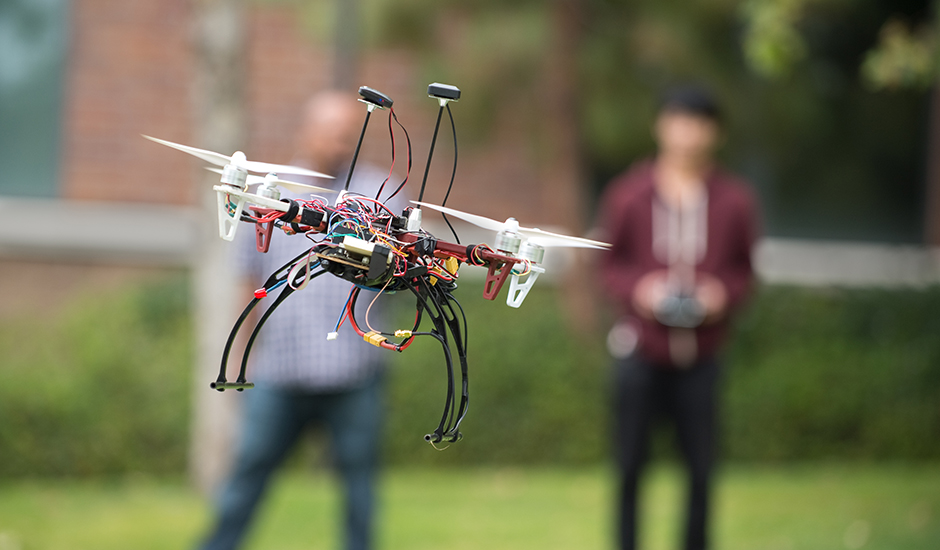| our attitude, aims & actions | infographics | breaking the mold | be boundaryless | the people | pdf version
breaking the mold
 darren fells '14
darren fells '14 mold-breaker
went from playing basketball in the bren to being the arizona cardinal's tight end
When you’re an Anteater, football at the collegiate and professional level is something
you watch, not necessarily play (at least competitively). Unless you’re Darren Fells
’14. As the tight end for the Arizona Cardinals, he’s UCI’s first NFL player, which
is quite remarkable, considering that we don’t have a football team. The former Anteater
basketball star was a standout on the high school gridiron before deciding to focus
on the court – instead of the field – once he got to college. He later played basketball
professionally for five years in Europe and South America before being drafted into
the NFL during open tryouts in 2012. But Fells got much more out of his college experience
than a career as a professional athlete. His degree in sociology has helped him both
on and off the field, and he hopes to pursue a career in counseling when his time
in the NFL comes to a close.
Mold-breaker, indeed.
Like Fells, we’re breaking with tradition as we seek to make our footprint (albeit
by tackling innovative research endeavors and outreach efforts, rather than the opposing
team). And like Fells, football will play a role in that effort.
BREAK THE MOLD.
Make a global & local footprint through research & outreach that makes a difference.
[study outside the silos]
Our faculty have been forging connections with leading researchers in computer science, engineering, arts, humanities, law, medicine and environmental science to study factors impacting regulation and policy adoption, health and human behavior.
Two significant changes since our 2007 plan include a commitment to research infrastructure (e.g., the Experimental Social Science Lab, the U.S. Census Data Center, the proposed Institute for Advanced Social and Behavioral Analysis, the proposed fMRI research facility), and a major overhaul of our fundraising activity.
We’re currently in the process of purchasing equipment and commencing renovations for a functional magnetic resonance imaging facility for cognitive neuroscience research. The proposed Center for Advanced Brain Imaging and Analysis will anchor the university’s neuroimaging initiative, with the recruitment of key faculty members across the campus. And an area of study of particular interest includes brain injury brought on by contact sports. See? There really was a football tie-in.
In 2014-15, we overhauled our fundraising operation with the recruitment of three new external relations and advancement professionals. This fully-staffed team is building a Board of Councilors, a Dean’s Leadership Society and an Alumni Network. And their fundraising goals closely align with the school’s three core interdisciplinary areas of study: neuroscience, population and public policy, and emerging conflicts.
We also remain committed to publicizing faculty research to reach a wide audience. Our research has a strong media presence, with more opportunities for dissemination ahead. We’ve embarked on projects that are enhancing our reputation and standing in the local community.
These include partnerships with the Orange County United Way to conduct a comprehensive study of homelessness, our collaboration with the Irvine Chamber of Commerce on the annual Irvine Chamber’s Business Outlook, beginning in 2016, and a planned collaboration with Asian Americans Advancing Justice on an Orange County needs assessment.
Moving ahead, we plan to develop a full research and grant-writing support shop, with the help of the Office of Research, and push more research funds down to faculty members. We will seek to boost our research grant portfolio and expenditures in order to provide additional revenue sources that will minimize the effects of future periods of budget contraction.
 kelsey minarik '08
kelsey minarik '08entrepreneurial anteater
who turned her health scare into a top 30 successful startup
This agenda will entail continued effort to boost utilization of shared research facilities as well as to promote grant writing.
We will also take advantage of a number of national and regional scientific collaborations and funding initiatives, ranging from the federal and California Brain Initiatives to the NSF’s new Interdisciplinary Behavioral Social Sciences program (from which a UCI team received one of the inaugural grants), to federal and philanthropic initiatives in global population and health.
We currently have a number of highly successful outreach programs (Olive Tree Initiative, Global Connect, HABLA, Chicano/Latino Field Studies program), but they will need to start to secure additional sources of funding and faculty buy-in to remain sustainable.
We would like to develop additional programs for Orange County high schools beyond those served by Global Connect – which we will seek to bring to schools state – and nationwide. The international studies undergraduate major has developed ties to the Southern California Red Cross, Access California, the World Affairs Council of Orange County, and other organizations through internship programs. Chicano/Latino studies has developed relationships with several non-profits including the Delhi Center in Santa Ana and SOY in Costa Mesa. We plan to seek out more of these opportunities with some of our bigger departments and majors.
Faculty members have significant research and advisory relationships with organizations ranging from the U.S. Federal Reserve to the U.S. Agency for International Development, the IMF and World Bank, among many others. These are mainly faculty driven, and we seek to link more faculty to relevant opportunities. We are exploring how the Office of Global Engagement might help facilitate this.
Industry partnerships have so far been driven by individual faculty members. By creating two new infrastructures – a graduate internship program (RISE Research Internships for Student Entrepreneurship) and a proposed translational research shop (Institute for Advanced Social and Behavioral Analysis) – we intend to provide new incentives to create such partnerships, outreach programs for faculty and “in-reach” opportunities for potential industry partners.
We will continue to work with UCI Applied Innovation to educate our faculty on the process of creating startups as well as seek additional means of fostering entrepreneurial activity in the school. We have industry ties through internship programs, and we will seek out ways in which UCI can assist us in creating new relationships or using existing ones to promote social sciences to alumni, donors and other stakeholders.
We are integrally connected to a huge number of crosscampus collaborations. We will
work with the campus to find creative solutions to the perennial issues of overhead
return and credit for interschool, collaborative activity (whether grant activity,
fundraising, or industry partnerships), and providing support for grant-writing (which,
outside of ORU support, is currently minimal). We will seek campus assistance in finding
a way to address the allocation of teaching workload credit for interschool or collaborative
programs. We will also explore how the campus can help address the question of graduate
funding and degree credit for joint or concurrent programs (e.g., the J.D./Ph.D. program).
 robots to the rescue
robots to the rescuea cross campus collaborative research group hosts an annual robotics conference for high school kids
Some of our most successful, long-standing collaborations include the Center for Global Peace and Conflict Studies, Center for Research on International Migration, the Institute for Mathematical Behavioral Sciences, and the various partnerships among anthropology, history, critical theory and informatics. These have contributed to a number of new initiatives including the MSTS M.A. program. The highly successful PRIME-LC program in partnership with Chicano/Latino studies brings our expertise on Latino communities to the training of medical students. New areas of collaboration include the Center for Cognitive Neuroscience and Engineering; the proposed Interdisciplinary Neuroscience Program; the Big Data Initiative; and the Sustainability Initiative. We are currently exploring the launch of a Population Sciences Initiative that may take the form initially of training grant applicants while culminating in a bid for a National Institute for Child Health and Human Development (NICHD) Population Center. And we have been integral in the establishment of the concurrent J.D./Ph.D. program, an area of potential growth subject to resource constraints to recruit the kind of superior students for whom this program was designed.
Several existing successful community partnerships contribute to outreach around educational preparation for underserved and underrepresented youth: Jumpstart recruits, trains and supervises UC Irvine students working with Head Start and other early childhood programs in low-income neighborhoods. The Community Knowledge Project is funded by the California Endowment to promote community wellness in Santa Ana; faculty partnerships with Save Our Youth in Costa Mesa and the Delhi Center in Santa Ana around community engagement projects. Other existing partnerships contribute to our mission of global education: Global Connect, the Olive Tree Initiative, and the International Studies Public Forum. New initiatives include collaborations with the Orange County United Way and the Irvine Chamber of Commerce.
So to recap, our planned activities to promote study that reaches outside the silos include:
- Development of a full research & grant-writing support shop.
- Fundraising for translational research & outreach activities.
- Seeking collaborative partnerships with academic initiatives on & off campus.
- Developing & fundraising for student-led community outreach activities.
- Seeking out new & leveraging existing partnerships with organizations & industry.
- Communicating findings & efforts to expand community knowledge & inclusion.
| our attitude, aims & actions | infographics | breaking the mold | be boundaryless | the people | pdf version


connect with us